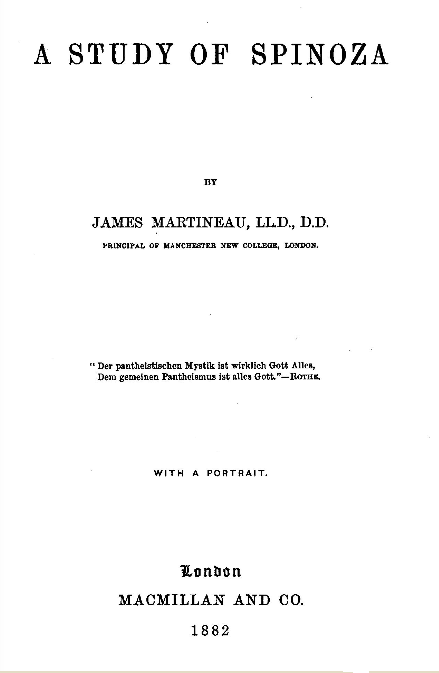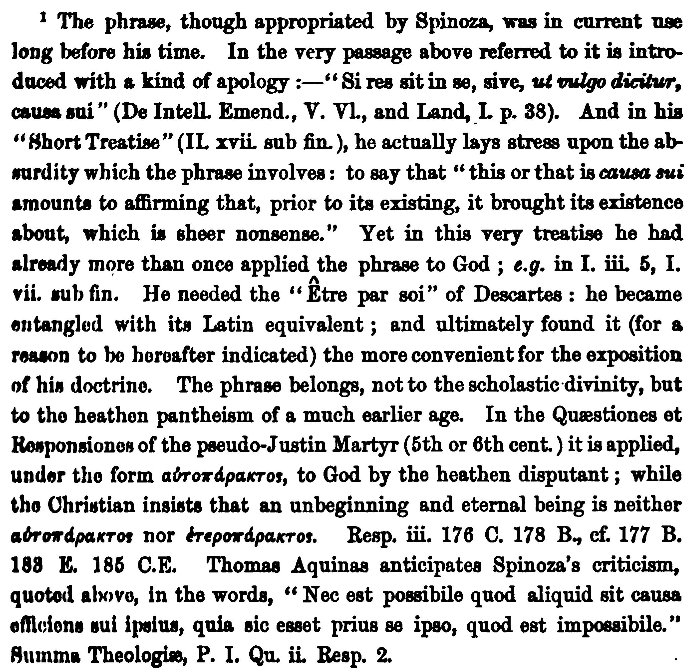James Martineau (1805 – 1900) A Study of Spinoza
 Martineau was een Engels religieus filosoof die grote invloed heeft uitgeoefend op het Unitarisme. 45 jaar was hij professor in Mental and Moral Philosophy and Political Economy in Manchester New College, het trainingscentrum van de Britse Unitariërs.
Martineau was een Engels religieus filosoof die grote invloed heeft uitgeoefend op het Unitarisme. 45 jaar was hij professor in Mental and Moral Philosophy and Political Economy in Manchester New College, het trainingscentrum van de Britse Unitariërs.
Op en.wikipedia een uitgebreide pagina over zijn denken en deelname aan debatten, die ik niet zal trachten samen te vatten. Mij gaat het er hier alleen om te wijzen op zijn boek, A Study of Spinoza dat in 1882 verscheen.
[te zien bij archive.org]
Ze hadden goed het voorwoord gelezen waarin James Martineau schreef:

Het motto is slecht te lezen. Er staat:
"Der pantheistischen Mystik ist wirklich Gott Alles,
Dem gemeinen Pantheismus ist alles Gott" - Rothe
PEEFACE.
I SHOULD hardly have undertaken to write this little book, had I foreseen the appearance of Mr. F. Pollock's comprehensive and masteriy volume on the same subject. Happily the contrasted scale of the two saves me from the danger of comparison; while a sufficient raison d'être may be found for both in the different points of view which they carry with them through criticisms seldom much at variance.From some want of skill in compressed exposition, I could not bring my account of Spinoza within the limits prescribed for the volumes in Professor Knight's "Philosophical Classics," for which series it was intended. As it has therefore to appear on its own account, I have tried to give it greater completeness by adding a chapter on the biblical criticism contained in the Tractatus Theologico-Politicus.
The recent appearance of Van Vloten and Land's authoritative edition of Spinoza's extant writings has enabled me to concentrate upon it most of the references which else would have been dispersed over many separate works. It is true that only the first volume has as yet been published. But, through the ready kindness of Dr. Land, I have been furnished with the numerical arrangement of the Correspondence in the second volume; so that it is only for the Memoir by Coler that I have been still obliged to refer to Paulus's edition.I am indebted to the kindness and special learning of Mr. Joseph Jacobs for an introduction to some of the critical writings which have been useful to me, particularly those of Joel, Van der Linde, and Land; and sincerely thank him for thus enlarging my acquaintance with the more recent Spinozistic literature.
Hearing from my friend, Mr. Serjeant Simon, M.P., that the Library at Wolfenbüttel contained a fine oil portrait of Spinoza, I obtained permission, through the kind intervention of Mr. James Sime, to have a photographic negative of it sent over for reproduction in suitable size for this volume. It is a pleasure to record my warm acknowledgments to the Librarian, Dr. O. von Heinemann for his courteous response to my application. The engraving prefixed to some copies of the Opera Posthuma, 1677, was taken from this portrait; not, it will be seen, with any eminent success.London, July 27, 1882.
Martineau is overigens sterk in debat met Spinoza en formuleert vooral allerlei kritiek. Ik neem slechts een voorbeeldje waar het gaat over ´causa sui´ - het nogal paradoxaal klinkende veroorzaken van zichzelf van de substantie. Hij heeft goed gezien dat daarachter de overtuiging schuilt dat alles een oorzaak moet hebben. Nadat hij daar een en ander over gezegd heeft geeft hij de volgende voetnoot op p. 118

Uiteraard werd het boek ter recensie in handen van Frederick Pollock gegeven, van wie in Mind [Vol. 8, No. 29 (Jan., 1883), pp. 104-108] een uitvoerige bespreking verscheen. Hij geeft Martineau enige complementjes; geeft hem de credits voor ”the probable identification of the Spanish town of Espinoza whence the family of Spinoza took its name. And the photograph of the Wolfenbüttel portrait makes a welcome addition.” Blijkbaar werd hier voor het eerst in een Engelstalig boek over Spinoza het Wolfenbütteler portret opgenomen. Maar hij schrijft ook: “I do not at present feel sure that the engraving of 1677 is immediately derived from it, though apparently Dr. Martineau does.” Merkwaardigste zinnetje vind ik Pollocks bewering “Spinoza knew French as well as Latin, or possibly better.” Waar hij dat vandaan heeft mag Joost weten.
Maar vervolgens geeft hij me toch een uitvoerige beschouwing over het onderwerp "het ene en het vele" bij Spinoza, of "hoe verklaart Spinoza het bestaan van eindige dingen" - om rooie oortjes van te krijgen. Ik verwijs graag naar die recensie in Mind.

